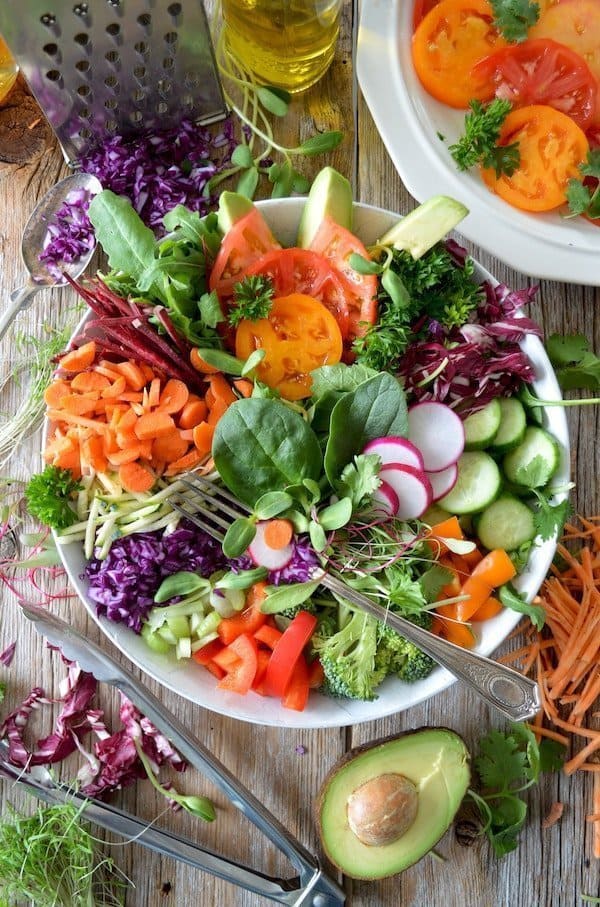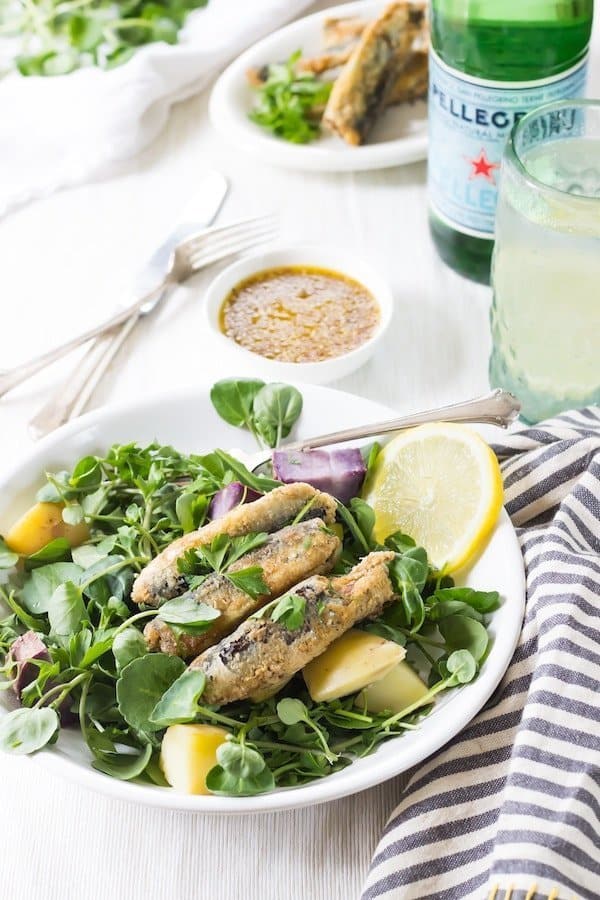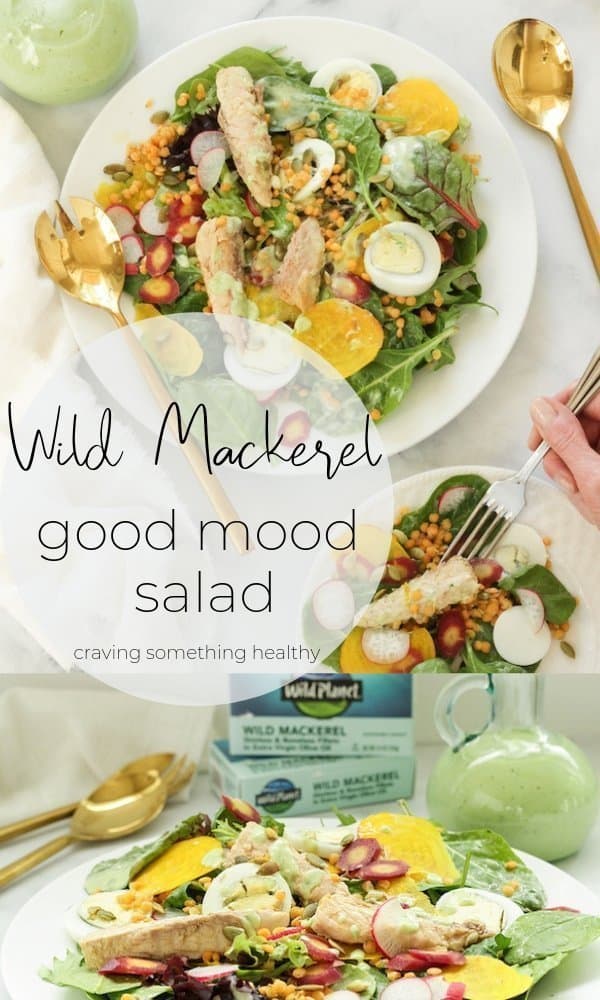The Best Foods to Beat the Winter Blues
This post and the related recipe for Wild Mackerel Good Mood Salad are sponsored by Wild Planet Foods. Thanks for supporting brands I use and love!
If it’s February, and you’re feeling low on energy and not quite yourself, the winter blues may be to blame. Fortunately, there are ways to beat the blues and regain your energy, and it starts with the foods you put on your plate.
Do you tend to feel a bit more down in the dumps during the winter? If so, you’re not alone. It’s estimated that between 14-20% of us (mostly women) experience a mild form of depression, known as “the winter blues.” (1) It’s especially common if you live in a northern latitude where the daylight hours are shorter, skies are often drearier and those winter-vortex temps limit your time outdoors.
A case of winter blues usually isn’t serious, but it can make you feel tired, lethargic, gloomy or just plain crabby. For many people, the major symptoms are sleep problems, lack of motivation, and that all-too-familiar craving for carbohydrate-rich comfort foods. If your Saturday nights are more about putting on your favorite pajamas and digging into a bowl of mac and cheese than getting dressed up for a night on the town – you might be a victim of the winter blues.

Blame it on the Chemical Messengers
The exact cause hasn’t been confirmed, but researchers are honing in on the effect that a lack of sunlight has on the hormones and chemicals that transmit messages in our brain.
When the daylight hours are shorter in the winter, many people experience lower levels of serotonin and higher levels of melatonin. Both play an important role in regulating circadian rhythms, also known as our internal clock. (2) When the levels of these hormones and neurotransmitters are out of balance, we’re more likely to experience anxiety and depression, feel more lethargic, and crave carbs.
Let Food Be Your Medicine
Most cases of the winter blues aren't serious. They don’t require medical treatment and they quietly disappear by springtime. In the meantime, if you’re feeling sluggish, out of sorts, and your scale or your favorite pair of jeans are noticing the effects of those extra carbs, it might interest you to learn that help is as close as the grocery store.

You’re probably aware that a healthy diet can have a positive impact on your energy level, but did you know there is a relationship between certain foods and your mood? The right foods can help to stabilize and balance out the hormones and neurotransmitters in your brain that contribute to your symptoms. Here’s what I recommend:
- Eat more fish! Researchers have long noticed that people who eat more fish have less depression, including seasonal depression. That’s even if they live in places where winters are long and dark. (3) They’re not exactly sure why fish helps with depression, but they believe it may be because the omega-3 fats found in fish help those chemical messengers, especially serotonin to work better. Higher fat fish like mackerel, sardines, anchovies, salmon, and tuna provide the richest sources of omega-3 fats, so aim to have at least 2 servings of those each week. Your heart will love them just as much as your brain!

- Bump up vitamin D- rich foods. Vitamin D levels are frequently lower in those who have seasonal or other depression. It may be due to less exposure to
sunlight, because much of our vitamin D is made when our skin is exposed to sunlight. (2) Make sure you have your vitamin D levels checked to see if you need asupplement, and incorporate more vitamin D-rich foods into your diet. Fish wins in this category too, because salmon, tuna, mackerel, and sardines are some of the best sources of vitamin D, followed by fortified milk, egg yolks, and mushrooms.
- Add some good bacteria. Foods that provide a dose of healthy bacteria or probiotics help to repopulate and feed your gut microbiome. That’s important because your microbiome helps to regulate so many aspects of our health, including sleep patterns, circadian rhythms, and mood. Researchers have determined that people who have a healthier and more diverse gut microbiome tend to sleep better, have better cognitive (brain) function, and
less mood disorders like anxiety and depression. (4) Add a good serving of fermenteddairy like kefir or yogurt, fermented vegetables like kimchi or sauerkraut, or a shot of kombucha every day. Check the label and make sure it says “live and active cultures.”
- Embrace your healthy fats. You’ve probably heard about the heart health benefits of the Mediterranean diet, but there’s also proof that it helps with brain function and depression. (5,6) Omega-3 and mono or polyunsaturated fats help to build healthier neurons and brain cells. Including more foods like - you guessed it - oily fish, especially mackerel, sardines, salmon and anchovies, as well as nuts, flax, pumpkin or sunflower seeds, avocados, olives and olive oil along with a diet that’s high in fruits and vegetables and lower in sugar has been shown to improve symptoms of depression. (5)
- Choose “smart carbs”. There’s a reason most people tend to crave carbohydrate-rich foods when it’s cold and dark out. Those foods can boost up levels of serotonin, that feel-good hormone that tends to dip in the winter. (6) Unfortunately, eating refined carbs like pasta, bread and cookies
tends to backfire because they wreak havoc with your blood sugar and insulin, and they pack on the pounds. Instead, make sure every meal (and snack) includes a good serving of colorful fruits and vegetables, plus whole grains like farro, quinoa, or oats, or some legumes like lentils, chickpeas or other dried beans. These provide complex carbs which still boost serotonin levels, but they supply long-lasting energy that won’t tip the scale or spike your blood sugar. If you want a sweet treat, choose some dark chocolate. It’s low in sugar, and it stimulates endorphins in the brain which make you feel happier. (6)
- Finally, although you might think that extra cup of coffee and a donut, or a trip through the
drive through is what you need to boost your energy – don’t do it! Do your best to limit fast food, sweets, sodas, and excess caffeine and alcohol. They’ve been shown to make symptoms of depression worse. (7) Hit the salad bar instead and top your salad with some olive oil and fish.
Or better yet, stock up on Wild Planet's canned fish and make your own Good Mood Salad. Wild Planet's line of canned fish includes tuna, salmon, yellowtail, mackerel, anchovies, and sardines. They're all equally delicious, sustainably caught, and packed with protein and healthy omega-3 fats. That means you can feel good about eating them and serving them to your family.
I created this Wild Mackerel Good Mood Salad so that every single ingredient in it has brain and mood enhancing benefits. Right down to the fresh herbs and kefir in the dressing. Brain food just doesn't get any easier or
When you’re knee deep in snow and subzero temps, the winter blues can take a toll, but these good-mood foods can make a huge difference in how you feel. Work on adding as many of these Winter Blues-Busting Foods as you can each day, and you might just be surprised at how quickly the rest of the winter flies by.
References:
- More than the winter blues? Rush University Medical Center. https://www.rush.edu/health-wellness/discover-health/more-just-winter-blues. Accessed January 30, 2019.
- Melrose S. Seasonal affective disorder: an overview of assessment and treatment approaches. Depression research and treatment. 2015;2015.
- Li F, Liu X, Zhang D. Fish consumption and risk of depression: a meta-analysis. J Epidemiol Community Health. 2016 Mar 1;70(3):299-304.
- Li Y, Hao Y, Zhang B, Fan F, Zhang B. The role of microbiome in insomnia, circadian disturbance and depression. Front Psychiatry. 2018;9:669.
- Opie RS, O'Neil A, Jacka FN, Pizzinga J, Itsiopoulos C. A modified Mediterranean dietary intervention for adults with major depression: Dietary protocol and feasibility data from the SMILES trial. Nutritional neuroscience. 2018 Aug 9;21(7):487-501.
- Kate PE, Deshmukh GP, Datir RP, Rao JK. Good Mood Foods. J Nutr Health Food Eng. 2017;7(4):00246.
- Sánchez-Villegas A, Toledo E, de Irala J, Ruiz-Canela M, Pla-Vidal J, Martínez-González MA. Fast-food and commercial baked goods consumption and the risk of depression. Public Health Nutr. 2012;15(3):424-432.
Do you feel down when there's less sunshine in the winter? Any tips you'd like to share?
Eat well!



Such a great collection of ideas! The winter is definitely tough, no doubt it can drag down moods, especially as it wears on with gray skies - love the idea that our food can help get us through!
Thanks for reading Monica! I'm a big believer that food is medicine and can help with so many different health issues!
This is so helpful. The winter blues always get hold of me and one of the ways I cope is through garden planning. Eating the right foods is another great thing to focus on. Thanks!
Thanks for reading! I love to garden too, and one of my goals is to learn how to grow more vegetables instead of flowers!